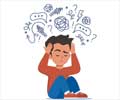
"We wanted to test the idea that stress causes a loss of brain synapses in humans. We show that circuits normally involved in emotion, as well as cognition, are disrupted when this single transcription factor is activated," said senior author Ronald Duman, the Elizabeth Mears and House Jameson Professor of Psychiatry and professor of neurobiology and of pharmacology.
The research team analyzed tissue of depressed and non-depressed patients donated from a brain bank and looked for different patterns of gene activation.
The brains of patients who had been depressed exhibited lower levels of expression in genes that are required for the function and structure of brain synapses.
Lead author and postdoctoral researcher H.J. Kang discovered that at least five of these genes could be regulated by a single transcription factor called GATA1. When the transcription factor was activated, rodents exhibited depressive-like symptoms, suggesting GATA1 plays a role not only in the loss of connections between neurons but also in symptoms of depression.
Duman theorizes that genetic variations in GATA1 may one day help identify people at high risk for major depression or sensitivity to stress.
Advertisement
Advertisement
Source-ANI













